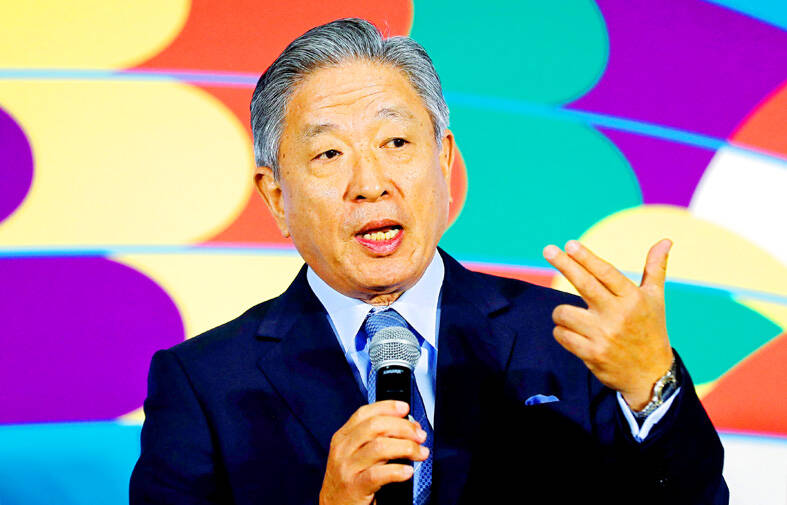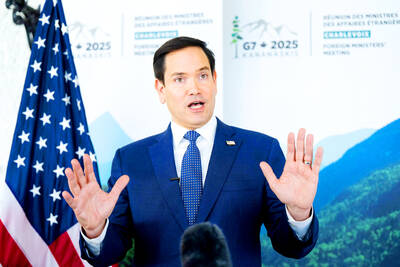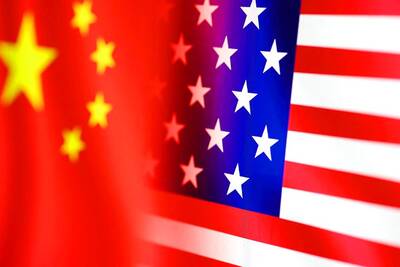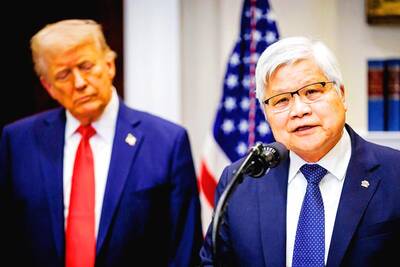A deputy foreign minister is to attend this week’s meeting of Pacific island leaders in Tonga, the Ministry of Foreign Affairs said yesterday, as China and the US jostle for influence in the region.
The Pacific is also an area of competition between Taipei and Beijing, as China whittles away at the number of countries that maintain formal diplomatic relations with Taiwan. Three countries — Palau, Tuvalu and the Marshall Islands — have stuck with Taipei.
Deputy Minister of Foreign Affairs Tien Chung-kwang (田中光) would hold a summit with its three Pacific allies to bolster its partnership with them and other “like-minded countries,” a reference to Western democracies such as the US and Australia, the ministry said.

Photo: Reuters
In January, shortly after President William Lai (賴清德) won the presidential election, Nauru switched ties from Taiwan to China, in what Taipei said was part of a sustained Chinese pressure campaign.
In 2018, Nauru, then still an ally of Taiwan, criticized an “insolent” China for speaking out of turn at the Pacific Islands Forum. Nauru had recognized China before, from 2002 to 2005.
Taiwan has participated in the forum since 1993 as a development partner under the name “Taiwan/Republic of China.”
Since they last met, the forum’s 18 scattered members have been buffeted by economic headwinds and escalating competition between the US and China.
Beijing has been painstakingly courting Pacific nations, using its largesse to build government offices, sporting venues, hospitals, highways and more.
Fearful that China could spin this into a permanent military presence, the US and Australia have responded by dishing out aid, inking bilateral agreements and reopening long-dormant embassies.
Climate change and security are expected to dominate discussions at this week’s meeting of the 18 Pacific island leaders. US Deputy Secretary of State Kurt Campbell would also be attending.
Taiwan and Tonga had diplomatic ties from 1972 to 1998 when the country switched recognition to Beijing and broke off relations with Taipei.
Only 12 UN member countries maintain official diplomatic ties with Taiwan.
Additional reporting by AFP

‘CROWN JEWEL’: Washington ‘can delay and deter’ Chinese President Xi Jinping’s plans for Taiwan, but it is ‘a very delicate situation there,’ the secretary of state said US President Donald Trump is opposed to any change to Taiwan’s “status quo” by force or extortion and would maintain that policy, US Secretary of State Marco Rubio told the Hugh Hewitt Show host on Wednesday. The US’ policy is to maintain Taiwan’s “status quo” and to oppose any changes in the situation by force or extortion, Rubio said. Hewitt asked Rubio about the significance of Trump earlier this month speaking with Taiwan Semiconductor Manufacturing Co (台積電) chairman C.C. Wei (魏哲家) at the White House, a meeting that Hewitt described as a “big deal.” Asked whether the meeting was an indication of the

‘RELATIVELY STRONG LANGUAGE’: An expert said the state department has not softened its language on China and was ‘probably a little more Taiwan supportive’ China’s latest drills near Taiwan on Monday were “brazen and irresponsible threats,” a US Department of State spokesperson said on Tuesday, while reiterating Washington’s decades-long support of Taipei. “China cannot credibly claim to be a ‘force for stability in a turbulent world’ while issuing brazen and irresponsible threats toward Taiwan,” the unnamed spokesperson said in an e-mailed response to media queries. Washington’s enduring commitment to Taiwan will continue as it has for 45 years and the US “will continue to support Taiwan in the face of China’s military, economic, informational and diplomatic pressure campaign,” the e-mail said. “Alongside our international partners, we firmly

KAOHSIUNG CEREMONY: The contract chipmaker is planning to build 5 fabs in the southern city to gradually expand its 2-nanometer chip capacity Taiwan Semiconductor Manufacturing Co (TSMC, 台積電), the world’s biggest contract chipmaker, yesterday confirmed that it plans to hold a ceremony on March 31 to unveil a capacity expansion plan for its most advanced 2-nanometer chips in Kaohsiung, demonstrating its commitment to further investment at home. The ceremony is to be hosted by TSMC cochief operating officer Y.P. Chyn (秦永沛). It did not disclose whether Premier Cho Jung-tai (卓榮泰) and high-ranking government officials would attend the ceremony. More details are to be released next week, it said. The chipmaker’s latest move came after its announcement earlier this month of an additional US$100 billion

Authorities yesterday elaborated on the rules governing Employment Gold Cards after a US cardholder was barred from entering Taiwan for six years after working without a permit during a 2023 visit. American YouTuber LeLe Farley was barred after already being approved for an Employment Gold Card, he said in a video published on his channel on Saturday. Farley, who has more than 420,000 subscribers on his YouTube channel, was approved for his Gold Card last month, but was told at a check-in counter at the Los Angeles International Airport that he could not enter Taiwan. That was because he previously participated in two